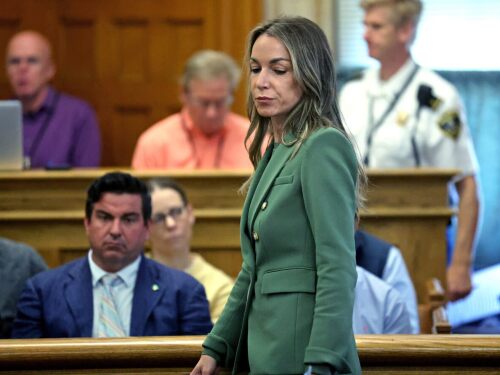The defense in the second trial of Karen Read rested its case on Wednesday and said Read was framed for the killing of her Boston police officer boyfriend.
Read, 45, is accused of fatally striking O’Keefe with her SUV and leaving him to die in the snow outside another officer’s home when she dropped him off at a party in January 2022 after the two had been drinking. She’s charged with second-degree murder, manslaughter and leaving the scene in Canton, outside Boston.
Prosecutors have said Read intentionally struck O’Keefe with her sport utility vehicle and left him to die. Read’s defense has suggested she was the victim of a wide-ranging conspiracy that included planting evidence and using her as a convenient scapegoat for her boyfriend’s death.
Defense attorneys in the case have accused the prosecution of twisting Read’s words into a confession she never made. The state has pointed to a television interview in which Read said, “I mean, I didn’t think I ‘hit him’ hit him, but I could I have clipped him?”
“That’s a person trying to make sense of an unexplainable circumstance, a natural concern of a bereaved significant other,” he said.
A crash expert who testified for the defense said, based on tests he performed, the damage to Read’s taillight and O’Keefe’s clothing was inconsistent with her SUV striking an arm or body at the speed described by the prosecution.
Dr. Elizabeth Laposata, a former medical examiner called by the defense, said O’Keefe’s injuries were indeed consistent with blunt force trauma to the back of the head, but that his eye wounds were not consistent with being hit by the rear of Read’s SUV. She also testified she did not think O’Keefe was hit by the SUV at all.
The defense also unsuccessfully sought a mistrial earlier in the second trial. Read’s first trial ended in a mistrial due to a hung jury. The attempt for a second mistrial hinged on a defense theory that O’Keefe was beaten inside the home where the party took place, and that he was bitten by a family dog and then left outside as part of a conspiracy by the police that included planting evidence against Read.
The defense team tried for a second mistrial after the prosecution pointed out that no dog DNA was found on O’Keefe. The defense said there had been no mention in the trial about DNA and the dog bite, and argued that raising the subject while questioning Russell had prejudiced the jury.
Superior Court Judge Beverly Cannone said the trial could proceed.
The defense has also attempted to show that police were biased against Read from the start and wanted to pin O’Keefe’s death on her. Jonathan Diamandis, a friend of Michael Proctor, the lead investigator of Read’s case, was asked by the defense team to read text messages that Proctor sent to friends about the investigation.
Proctor was fired in March after a disciplinary board found he sent sexist and crude text messages about Read to his family and colleagues. His testimony played a key role in the first trial. Defense attorneys used his text messages to attempt to show that Proctor was biased and ignored the possibility of other suspects.
The next big step in the case is closing statements from both sides. The case will then go to the jury.
This story was originally published by the Associated Press.







